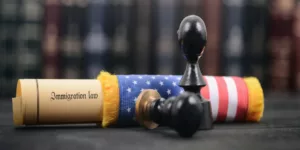Married couples immigrating to the U.S. will have to go through an interview as part of the green card process. If you envision being separated and interrogated on every little detail of each other’s lives, you’d be partly wrong. These types of interviews do happen, but they are rare.
Although the interview is typically a tamer affair than what’s depicted in Hollywood films, the process shouldn’t be taken lightly. It’s important to be prepared for the meeting.
Be on Time and Dress Appropriately
Arrive on time for the interview. Showing up late will give the impression that the interview is not a priority. Ideally, you should arrive 30 minutes early.
If you have hired an immigration attorney, it’s important to wait for him or her before starting the interview. Do not begin the interview until your attorney is present. Make sure that you discuss what to do if your attorney is running late.
Dress appropriately for the interview. Keep in mind that your appearance will make a first impression when meeting with the USCIS officer. Dress conservatively and professionally – as if you were attending a job interview.
Bring Documentation Proving the Legitimacy of Your Marriage
You will have two opportunities to prove the legitimacy of your marriage: when you file the petition and when you attend the interview.
Consider submitting more than just the minimum required documentation when filing the petition. Make sure that you’re prepared and well-organized before the interview day.
Take the time to organize your documentation prior to the interview, and make sure that you have copies of the documents you submit. Consider creating an index of your documents. This will make the officer’s life easier and reduce the risk that he or she will miss one of the documents and ask for resubmission.
Be Yourself
During the interview process, listen and respond appropriately. Be yourself. It’s natural to be nervous about the interview, but it’s important to do your best to just be yourself.
Make eye contact. Be respectful. Keep your answers short and to the point. If the officer needs more information, he or she will ask you to elaborate or ask another question.
Don’t Try to Guess Answers
If you don’t know the answer to a question, be honest. Trying to guess an answer could land you in hot water. Instead, tell the officer you “do not know” or “cannot remember.”
If you guess an answer and your spouse offers a different answer, it could raise suspicions about the validity of the marriage.
Keep in mind that you don’t actually have to memorize anything for the interview. There are no specific “test” questions that are asked. Answer honestly and to your best ability.
The questions will focus primarily on the history of your relationship, your daily activities as a couple and your future plans. Some questions can get very personal, so be prepared for them. Be honest, direct and succinct when giving answers.
Couples are Typically Interviewed Together
It’s common for couples to be interviewed together by the same USCIS officer, but there is a chance that you will be interviewed separately, either by the same officer or two different officers.
Separate interviews are known as “Stokes” interviews. Officers from the Fraud Detection and National Security unit will typically carry out these types of interviews. In this case, spouses are interviewed separately and their answers are compared to look for inconsistencies.
Sometimes, a couple that has been interviewed together will be called in for a Stokes interview.
There are a few reasons why some couples would be interviewed separately:
- USCIS has uncovered evidence contradicting the validity of the marriage.
- USCIS has identified “red flags” that suggest the possibility of a fraudulent marriage.
- The officer may choose to switch to a Stokes interview if new information comes up that they wish to explore.
There are Different Possible Outcomes for the Interview
The green card interview can result in a few different possible outcomes. Of course, the desired outcome is approval. If approved, the officer will inform you in person that your case will be approved.
The officer may also request more evidence. In this case, an RFE (request for evidence) will be filed. Extra documentary proof, such as bank statements, utility bills and statements from friends and family regarding the marriage, may be required.
An additional review or second interview may also be required. Of course, there is also the possibility that you will be denied after the interview.








